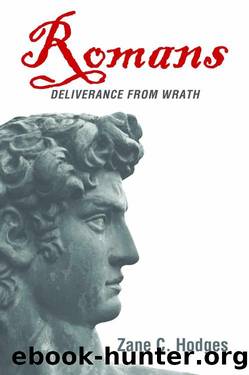Romans: Deliverance From Wrath by Zane Hodges

Author:Zane Hodges [Hodges, Zane]
Language: eng
Format: epub
Tags: Exegesis, Hermeneutics
ISBN: 9780978877361
Goodreads: 19053746
Publisher: Grace Evangelical Society
Published: 2013-03-31T22:00:00+00:00
8:33-34. Who shall bring a charge against God’s chosen ones? God is the One who justifies. Who is the one who condemns? Christ is the One who died, and moreover who also rose, who also is at the right hand of God, who also intercedes on our behalf.
All that Paul has been saying in 8:18-32 has been predicated on the truth that we stand justified before God. That is why after concluding his exposition of justification in 3:21–4:25, Paul had proceeded to anticipate the results of this in triumphant, hope-filled suffering (5:1-5). Paul has now elaborated this suffering/glory theme and he proceeds in vv 33-34 to tie it again to the truth of justification.
In the midst of any experience of suffering there is almost always the temptation to say, “I am guilty and I deserve this.” If our conscience does not produce it, the suggestion will almost certainly be made by Satan himself through the agents he uses to inflict that suffering or to add to it. Paul had much experience of that as the book of Acts shows clearly and as he himself acknowledged (1 Cor 4:9-13).
But there is no legitimate condemning voice against the believer who co-suffers with Christ. Who can bring a charge against God’s chosen ones? God Himself is the Justifier of such persons. Of course, the Greek term rendered here by chosen ones is the usual one normally translated as “the elect” (eklektōn). As v 29 makes clear these chosen ones are those whom God “knew beforehand” in eternity past (see discussion under v 29). In Eph 1:4 Paul states the same truth: “He chose (exelexatō) us in Him [Christ] before the foundation of the world.”
God does not accept charges against His chosen ones who are already in the stream of His plans for them which end in eternal Christlikeness (vv 29-30). After all, He is the One who justifies them. Nor can this justification be properly challenged by anyone (Who is the one who condemns?), since it is based on the fact that Christ is the One who died and who also rose. Paul has already made quite clear the centrality of Christ’s death and resurrection as the basis for God’s act in justifying us by faith (cf. 3:21-26; 4:22-25).
But here Paul adds two further elements that he has not previously explicitly mentioned. (His threefold use of kai [also] here has the effect of reinforcing his point step by ascending step.) The One who died, and moreover who also rose is a Person who also is at the right hand of God and there also intercedes on our behalf. Although the last truth expressed here is highlighted by the anonymous author of Hebrews, Paul nowhere else in his epistles refers to the intercessory work of Christ on our behalf in the presence of God. (He has referred to the intercession of the Holy Spirit within us: 8:27.)
Obviously Paul could assume that his Roman readers needed no explanation of this truth. Here he invokes it
Download
This site does not store any files on its server. We only index and link to content provided by other sites. Please contact the content providers to delete copyright contents if any and email us, we'll remove relevant links or contents immediately.
The 5 Love Languages: The Secret to Love That Lasts by Gary Chapman(9815)
The Space Between by Michelle L. Teichman(6939)
Assassin’s Fate by Robin Hobb(6216)
Wiseguy by Nicholas Pileggi(5784)
Everything Happens for a Reason by Kate Bowler(4743)
Gerald's Game by Stephen King(4654)
Pillow Thoughts by Courtney Peppernell(4284)
A Simplified Life by Emily Ley(4161)
The Power of Positive Thinking by Norman Vincent Peale(4064)
Harry Potter and the Prisoner of Azkaban (Book 3) by J. K. Rowling(3359)
Resisting Happiness by Matthew Kelly(3341)
Girl, Wash Your Face by Rachel Hollis(3282)
Being Aware of Being Aware by Rupert Spira(3276)
The Secret Power of Speaking God's Word by Joyce Meyer(3218)
The Code Book by Simon Singh(3189)
More Language of Letting Go: 366 New Daily Meditations by Melody Beattie(3029)
Real Sex by Lauren F. Winner(3022)
Name Book, The: Over 10,000 Names--Their Meanings, Origins, and Spiritual Significance by Astoria Dorothy(2987)
The Holy Spirit by Billy Graham(2952)
